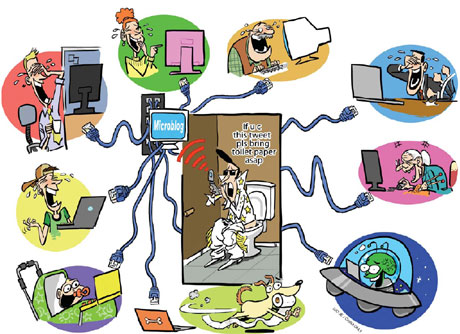Society
Chirpy about tweets
By Hu Yongqi (China Daily)
Updated: 2011-02-02 08:46
 |
Large Medium Small |

Cheng Yuan and three friends recently went to a restaurant in Beijing's Chaoyang district. Before checking the menu they took out their mobile phones and started sending a series of tweets. Cheng, who had been to the restaurant before, said he sent a tweet suggesting a dish and his companions silently answered with tweets. They have been communicating like this since August 2010. They are an extreme example of a segment of the population who are devoted to micro-blogging and describe themselves as "addicts" - but Cheng and his friends are not alone. The National Report on Micro Blogs in 2010, released by Shanghai Jiaotong University in December, suggests more than 65 million people are active micro blog users. Micro-blogging here is much the same as in other countries, with the ability to send images or embedded videos, and messages with a maximum of 140 characters.
Over the past three years, more than 50 operators have started providing micro blog services and many people believe the pattern of information exchange between people has been transformed.
"About 160 out of 192 followers on my micro blog are close friends. We don't send text messages anymore, we contact each other by micro blog," said the 27-year-old consultant on overseas studies.
But his micro blog is not just for friendly messaging, it's also for criticism. In October, Cheng tweeted that the service at a restaurant was bad. The restaurant owner responded to him, apologized and invited him to have a dinner on the house to prove the service had improved. Cheng accepted and said they are good friends now.
Cheng said another advantage of micro-blogging is that he can follow pop stars and gets the opportunity to chat with them on his micro blog.
"The interaction between me and public figures shows that the distance between us has been reduced. This is not something I could do in the real world," Cheng said.
Government officials have also taken up micro-blogging. Wu Hao, the spokesman for Yunnan province's Party Committee when he started micro-blogging in November 2009, now has more than 15,000 followers (known as "fans" in China), though he is no longer the spokesman.
In early 2010, the Foshan public security bureau in Guangdong province registered its micro blog on Sina Weibo. Today, local public security bureaus have registered more than 500 micro blogs.
Of all the government micro blogs registered in 2010, those opened and maintained by public security bureaus make up more than 70 percent, according to the National Report on Micro Blogs in 2010.
At the same time, pop stars, scholars and businessmen have joined up. Celebrities Yao Chen and Na Ying have, respectively, nearly 5 million and more than 1 million followers; while Pan Shiyi, chairman of SOHO China, one of the largest real estate developers in Beijing, has 3.1 million.
Yao tweets about her acting activities and expresses how she feels; while Na was caught out in January when she tweeted that her assistant required a police car to fetch the costume she had forgotten for a Spring Festival performance at the Beijing Traffic Management Bureau. Na was severely criticized for taking advantage of her position and later apologized for her "poor attitude".
Many Chinese enterprises have caught onto the potential of e-marketing via micro blogs. Sina Weibo had about 50 million users in October and has been trying to encourage more people to sign up by diversifying its services. Since November, users have been able to upload pictures, videos and share web links with followers.
| 分享按钮 |



